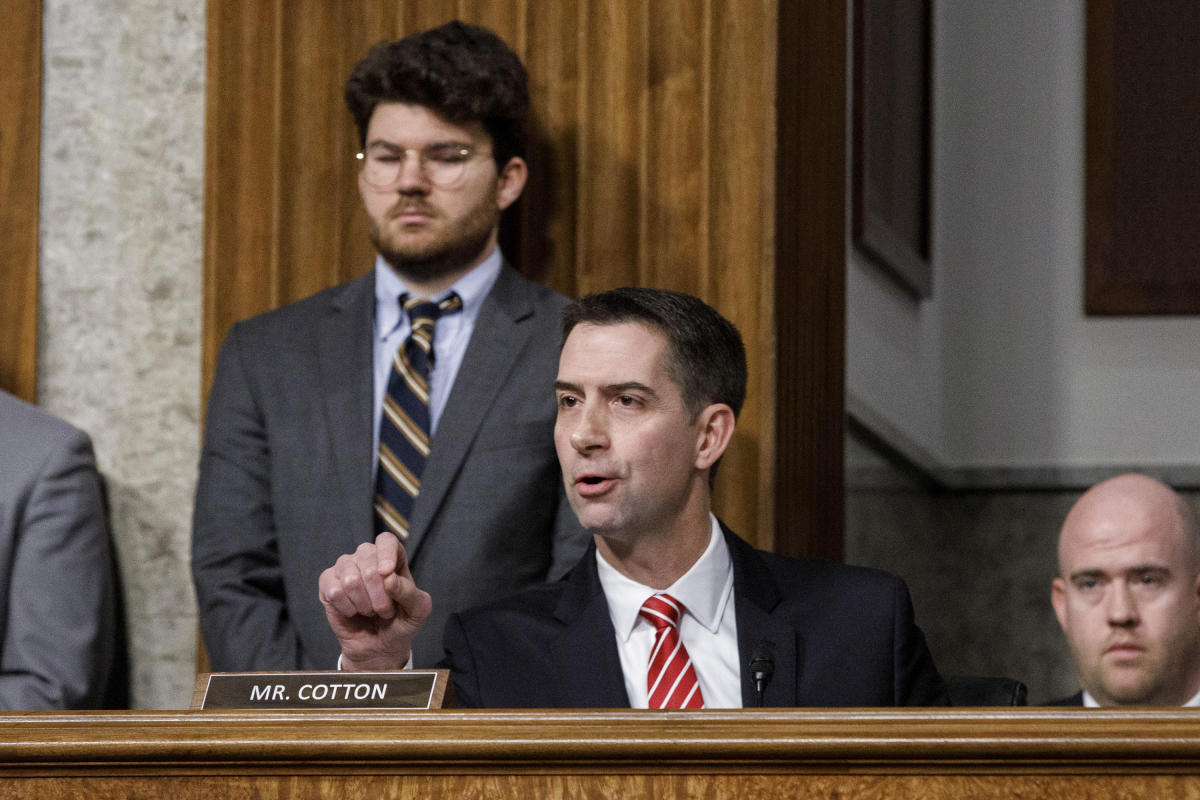

WASHINGTON — When Rep. Marjorie Taylor Greene, R-Ga., stood on the House floor this month to announce her proposal to censure the only Somali-born member of Congress, she said she was seeking punishment for “Rep. Ilhan Omar of Somalia — I mean Minnesota.”
Earlier that same week, Rep. Troy Nehls, R-Texas, called the Black husband of another Democratic woman of color, Rep. Cori Bush of Missouri, a “thug.” He then said Bush, who is also Black, had received so many death threats because she was “so loud all the time.”
At a hearing across the Capitol, Sen. Tom Cotton, R-Ark., grilled the CEO of TikTok, Shou Chew, about his nation of origin. Cotton repeatedly demanded to know whether Chew, who is from Singapore and of Chinese descent, was Chinese, held a Chinese passport or was a member of the Chinese Communist Party.
Sign up for The Morning newsletter from the New York Times
“No, senator — again, I’m Singaporean,” Chew responded with agitation after saying several times that he was not Chinese.
Around the same time, House Republicans released their report on impeachment charges against Alejandro Mayorkas, the Cuban-born homeland security secretary who is the first Latino to lead his department. Using unusually loaded language for a committee report, the panel described its action as “deporting Secretary Mayorkas from his position.”
In private, the language was uglier. During a closed-door meeting of House Republicans, Rep. Mark Green, R-Tenn., the panel’s chair, referred to Mayorkas as a “reptile with no balls” because of his refusal to resign from his post, according to Politico. A White House official condemned the statement, noting that Mayorkas is Jewish and that the comment echoed an antisemitic trope.
And that was all in the span of a week.
The racist discourse by Republican members of Congress, both in casual comments and in official statements, has become so commonplace that it now often slips by without any real condemnation from the GOP. Democrats frequently call for apologies but no longer expect any response, and those futile denunciations quickly disappear into a morass of polarized content on social media.
The pattern is playing out as the Republican Party once again coalesces behind former President Donald Trump, who routinely made bigoted statements during his first campaign for the White House and his presidency. His approach has encouraged some Republicans to freely use rhetoric that denigrates people based on ethnicity, religion or nationality.
“The nature of Trumpism is to embolden extremism,” said Rep. Ritchie Torres, a Black Democrat from New York. “Whether it’s badgering an Asian witness about his ethnic loyalties, or dehumanizing a Cabinet secretary, or accusing a Muslim woman of treason, or describing a Black man as a thug, Republican members of Congress are crossing lines that should never be crossed.”
Torres said the sad reality was that “the extreme elements have concluded that racism might be bad morals but it’s good politics.”
“Instead of representing what is best about America,” he said, “Congress increasingly represents what is worst.”
If Republicans on Capitol Hill have similar concerns, they rarely air them publicly. The office of Speaker Mike Johnson had no comment on the recent incidents.
The Republican Party, which for decades has relied primarily on white voters, has long exploited fear and prejudice to energize its base, whether it was Barry Goldwater vocally opposing the Civil Rights Act of 1964 or George H.W. Bush’s use of Black convict Willie Horton in a 1988 presidential ad.
Trump supercharged that strategy, entering the national political conversation by pushing the racist lie that former President Barack Obama, the nation’s first Black president, was not born in the United States.
As president, Trump routinely made racist remarks that transcended the dog whistle, calling African nations “shithole countries,” saying there were “very fine people on both sides” of a white supremacist rally in Charlottesville, Virginia, and telling the four Democratic congresswomen of color known as “the Squad” to “go back” to where they came from. (Of the four, only Omar was born outside the United States.)
Trump recently referred to Nikki Haley, a rival for the Republican nomination who is the daughter of Indian immigrants, as “Nimrada,” misspelling her first name, Nimarata. He also amplified social media posts falsely claiming that she was not born in the United States.
A spokesperson for Trump’s campaign, Steve Cheung, made no apologies for Trump’s language, saying, “President Trump is a truth teller, and the more people who follow his lead and speak their mind, the better.”
The race-baiting comments resonate with Trump’s political coalition, which is 85% white in a country that is 59% white and becoming less so every day. Republicans in Congress have also sought to capitalize on the grievances of their base.
Greene has been fundraising off her proposed censure of Omar, which was written relying on a mistranslation of her remarks in Somali that spread virally on right-wing social media, and she has fed the loop by amplifying the hate and misinformation online.
“Ilhan Omar embodies the biggest threat America faces: Migrant hordes invading our country with no real desire to assimilate or embrace what it means to be an American,” Greene wrote in a fundraising appeal to small donors. That language embraces the core tenets of a conspiracy theory known as replacement theory, which explains demographic changes as a plot by Western elites, including Jews, to replace and disempower white people.
Stuart P. Stevens, a former Republican strategist who has described the GOP as “a white grievance party,” pinned the recent spate of racist language directly on Trump.
“You don’t have to argue that Trump made people more racist, but I don’t think you can argue against the fact that he did give people permission to express their racist views,” Stevens said in an interview.
“You have someone who is running for the Republican nomination for president, who is mocking the ethnic heritage of his opponent,” he said, referring to Trump’s misuse of Haley’s first name. “There is no element of the Republican Party that punishes this.”
Condemnations by Democrats appear to have only emboldened Republicans.
In her censure resolution, Greene accused Omar of making “treasonous statements” and acting as a foreign agent of the Somalian government. She was reacting to a video of Omar speaking in Somali, which circulated on right-wing social media accounts that misquoted her as saying she was “Somalian first” and would dictate U.S. policy toward Somalia.
That translation has since been debunked by multiple independent news outlets. In fact, Omar’s comments were in line with the administration’s official position on Somalia.
“As long as I’m in Congress, no one will take Somalia’s sea,” she said. “And the United States will not support other people to rob us.”
But that did nothing to stop Greene from continuing to forge ahead with her measure, which quotes the mistranslation. While some Republicans said they were unlikely to support it, Greene insisted that she was “not rescinding it, not backing off.”
Her actions prompted a denunciation from Rep. Jim McGovern, D-Mass., which set off a social media feud. After Greene mocked McGovern’s bathroom habits, he responded, “Aren’t you late for a klan meeting?”
Democrats, meanwhile, said the “reptile” comment about Mayorkas was proof that the impeachment process itself was motivated by racism.
“Chair Green’s comments are plain bigotry,” said Rep. Delia Ramirez, D-Ill. “This whole impeachment process has been a bigoted, prejudiced spectacle.”
Republicans have not provided any proof of high crimes and misdemeanors as they try to impeach a Cabinet secretary for the first time since 1876. Instead, they have accused Mayorkas of deliberately encouraging an “invasion” of immigrants and plan to hold a second vote on his impeachment Tuesday, after their first attempt failed.
The AAPI Victory Fund, a political action committee supporting Asian American candidates, condemned Cotton’s questioning of Chew as “disgraceful, blatantly racist and deeply dangerous.” But the senator defended it in an interview with Fox News.
“It’s entirely reasonable to pursue a line of questioning about whether he himself, like his company, is subject to the influence of the Chinese Communist Party,” Cotton said.
Rep. Hakeem Jeffries, D-N.Y., the minority leader, said Nehls’ “thug” comment was “shameful” and “clearly peddled in racially inflammatory language.” He demanded an apology.
None came.
c.2024 The New York Times Company
EMEA Tribune is not involved in this news article, it is taken from our partners and or from the News Agencies. Copyright and Credit go to the News Agencies, email [email protected] Follow our WhatsApp verified Channel









